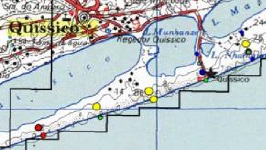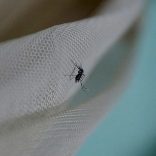Mozambique reports over 11.5 million malaria cases in 2024
Mozambique: Covid-19 triples in one week; mining beaches for white paint – By Joseph Hanlon

New Covid-19 cases triple in one week
New Covid-19 cases tripled in less than a week. This is clearly related to people ignoring preventive measures against Covid-19 during the festive season, the director of research at the National Health Institute (INS), Sergio Chicumbe, said Saturday. Crowds partied over the Christmas and New Year holidays, failed to wear masks, and ignored social distancing. (AIM 10 Jan)
Up to one week ago, deaths were averaging one per day, but in the past four days (Thurs-Sun 7-10 Jan) they jumped to five per day. Reporting of cases from the provinces is erratic, so it is best to use a three day moving average. A week ago (Monday 4 Jan) the 3-day average of new cases was 223 per day. Yesterday (Sun 10 Jan) the average of the previous three days was 659. People in hospital with Covid-19 increased from 88 to 114.
Two-thirds of cases are in Maputo city and province (mainly Matola), with other concentrations of cases in Sofala and Nampula. The 4,208 active cases of Covid-19 are in Maputo city: 2.497 (59%), Maputo Province: 390 (7%), Sofala: 251, Nampula: 214, Cabo Delgado: 166, Inhambane: 143, Manica: 125, Tete: 113, Zambezia: 112′, Niassa: 103, and Gaza: 94.
Mining
- Government cheated communities of $443,000
By law, the government must give 2.75% of minerals and gas revenues to local communities affected by extractive industries. But the report of the Extractive Industries Transparency Initiative (EITI) for 2019 says government cheated communities of $443,000.
The report says that the government 2019 budget execution report for 2019 says $1,112,000 was paid to communities. Under the law, the payment is 2.75% of revenue from two years before. The 2.75% of 2017 revenue should have been $1,555,000, which means $443,000 was not given to communities.
The EITI highlights that only one company, the Indian multinational Jindal, reported payments inaccurately. For its Tete coal mine, it claimed it paid the state $440,000 more in taxes than it actually did.
The report says that the total payments of the extractive industry to government in 2019 were $222 mn, which was 6% of government revenue. The report was launched 14 December.
The full report is extremely detailed, with legislation, details of state companies involved, and all the extractive companies: https://eiti.org/document/mozambique-2019-eiti-report (Portuguese only)
An Extractive Industries Transparency Index stressing “transparency” was compiled by CIP (Centro de Integridade Publica) in October. The most transparent companies, in order, were Kenmare, Vale, Total and Montepuez Ruby Mining. The least transparent is the state mining company (Empresa Mocambicana de Exploracao Mineira, EMEM) http://bit.ly/Moz-CIP-trans
- The entire Xai Xai to Inhambane coast may be dug up to make white paint
The entire 300 km coast from south of Xai Xai to Inhambane city is allocated for heavy sands exploration and mining, which involves huge dredges digging up the sand dunes along the coast. “Heavy sands” have titanium (mainly used for white paint) as well as smaller amounts of limonite, rutile and zircon (also used in white colouring and in foundry and industrial applications).
Heavy sands in Gaza and Inhambane are found in three strips: very close to the present coast, in an ancient coastline and dunes about 60 km inland, and in various old dunes in between. The first project in this zone to go into production is Corridor Sands, 10,500 ha just north of Chibuto and the Limpopo River, and 50 km inland in ancient dunes, The mine is owned by Dingsheng Minerals, which is 85% owned by China’s Anhui Foreign Economic Construction Group and 15% by the Mozambican state mining company (Empresa Mocambicana de Exploracao Mineira, EMEM). It has been producing for more than year and mineral concentrate is trucked to Maputo port.
On 31 December the Australian based MRG Metals announced the confirmation of high grade minerals deposits in its Corridor concessions. That concession is a strip which starts east of Chibuto and Corridor Sands and extends to near the coast. The concession includes the N102 road and the town of Chongoene.
MRG Metals now holds 1000 square kilometres – 100,000 hectares – in the area. One section actually on the coast (known as Linhuane) is 11,000 ha which includes the town of Quissico and the lovely lagoons and beach down the hill. The map below shows part of the concession. The yellow and red dots near the shoreline indicate where drilling has shown exploitable mineral deposits, and suggest that MRM will want to dredge the entire dune barrier separating Lake Quissico from the sea.

Initial profits come from selling on licences and MRM areas have changed hands five times, and might be sold on again to one of the larger mining companies. The concessions are in the name of Sofala Mining, recently taken over by MRG Metals.
MRG has posted details and good maps on http://mrgmetals.com.au/exploration-projects
The government maintains an excellent updated data base and interactive cadastral map of all applications and concessions, on https://portals.landfolio.com/mozambique/pt/
A damning report about a Chinese heavy sands miner in Nagonha, Nampula, was published by Amnesty in 2018. The company “Haiyu likely contributed significantly to a flash flood in 2015 in the village of Nagonha, which destroyed 48 homes and left 270 people homeless,” Amnesty said. “Comparison of satellite images of the area between December 2010 and October 2014 show the build-up of mining-related sand deposits around Nagonha and the gradual change in the natural flow of water.” They show natural wetlands “north of the village were covered by the sand and that the channel connecting the lagoons west and north of the village to the sea had been completely blocked.” https://bit.ly/Amnesty-Haiyu-18
- Widespread complaints about miners
Kenmare cheated us, said a representative of the community of Topuito, Moma, on the Nampula coast where the Irish company Kenmare has been dredging heavy sands for a decade. “Today there is no fishing in Topuito, we have no agriculture in Topuito. How we will survive? But when we ask the company, all they say is that they bought the land from the government,” she said.
Communities affected by mining used the launch meeting of the EITI report to speak out. A representative from Moatize, Tete, said people moved off the coal mine by Vale had never had their badly built houses repaired and that 50 families were never given new farms, as promised in the resettlement agreement. A representative from Inhambane said Sasol only repaired the main EN1 road which benefitted their workers who live in Vilanculos, and did nothing in Pambara and Save for the people actually living in the gas producing area. (O Pais 15 Dec)
- Illegal gold mining
Large gold mining companies have been fined $400,000, had equipment confiscated, and licences suspended in Namuno, Cabo Delgado; Lupilichi, Niassa; and Manica, said Obete Matine, Minerals Resources Inspector General. In Manica, industrial miners Clean Tech Mining Company and Gems Resources saw their activity suspended and were fined more than $14,000 for recurrent water pollution, through dumping pollutants in rivers. They were not using water settling basins as they should, said Matine. (Carta de Mocambique, 30 Nov; DW 1 Dec)
Development
- Neoliberal zombie still haunts farming
The harsh neoliberalism of the 1990s is largely dead, but in one area – agriculture – it is still very much alive. Neoliberalism was imposed on developing countries at the cost of huge suffering in the 1990s. Government was to withdraw from the economy and leave it to the private sector. But the private sector had no interest in small farmers. Which the US and Europe already knew. More than half the farmers in the US and EU are family farmers, supported by huge subsides, marketing boards, guaranteed purchases and cash payments. But Europe and the US are major agricultural exporters, so they did not want competition from Africa. As we note below, the harm caused by structural adjustment and neoliberalism is being recognised and is increasingly being compensated with cash transfers.
And the zombie marches on. In India, huge protests by hundreds of thousands of farmers have been going on since 26 November – backed by large protests in London and elsewhere. The Indian government passed laws in September which will in effect end marketing boards and minimum prices. Farmer income has been falling and debts rising, and there were 10,281 farmer suicides in 2019. As in Mozambique 25 years ago, the neoliberal reforms were promoted on the ground that the would “free” the peasants. In Mozambique, just the opposite happened, and they were captured and exploited by private traders. Indian farmers have seen this happen all over the world and are trying to stop it happening there.
In Mozambique subsidies, guarantees, and marketing boards were ended. Most notoriously, the cashew sector was forced to close, at great cost to peasant farmers. It was one place the government decided to act. It set up the Cashew Institute (Incaju, Instituto do Caju) which acted in secret to support small producers and local processing. The power of the World Bank and donors was so strong it had to be in secret and the informal slogan was “don’t let the British know”. But it worked. It’s success has led Incaju to recently be expanded to the Edible Nut Institute (Instituto de Amendoas), with a specific brief of supporting smallholder production and local company processing of macadamia. (Cashew is detailed in chapter 5 of our 2008 book Do bicycles equal development in Mozambique? still on sale. The Portuguese edition, however, is available free on http://bit.ly/Hanlon-books)
The World Bank banned the hiring of more agricultural extension agents in 1999, saying support for farmers had to be done by the private sector. One unexpected result of the donor strike over the secret debt scandal was by halting aid, donors lost power, and could not block changes. Last year (2020) Agriculture etc Minister Celso Correia doubled the number of extensionists to 4000.
- Cash transfers & neo-liberal agriculture linked
In the 1980s and 1990s the donors, and especially the World Bank and IMF, imposed harsh structural adjustment programmes. Most countries were forced to adopt World Bank/IMF-written Poverty Reduction Strategy Papers, which were nearly identical for all countries and framed within the them fashionable neoliberal ideology.
At the same time, a few countries developed cash transfer programmes, notably Brazil, South Africa, Bolivia, and Mozambique (with its family grant – PSSB – Programa Subsídio Social Básico, which was started in the 1990s). When we wrote the book Just Give Money to the Poor in 2010 cash transfers were largely opposed by the neo-liberals. But in a new study just published, Stephen Devereux of the Institute of Development Studies shows how and why they reversed their position: “the international development community identified social cash transfers as their preferred instrument for addressing poverty and vulnerability in the global South in the early 2000s. This meant that they allocated funds and technical expertise towards advocating and implementing cash transfer programmes in countries where they operate – and withheld funds and technical expertise from policy instruments they do not support (such as food or fertiliser subsidies).” In other words, suddenly cash transfers became a way of compensating the poor for the harm done by neo-liberal agriculture policies. And exactly this is happening in India, where the cash transfer has been increased – but farmers have not accepted the bribe.
Devereux notes that some counties took another option. Malawi largely rejected cash transfers and put the money into its successful fertilizer subsidy programme, arguing that had more developmental benefit. There are no good studies comparing the two uses of scarce resources, Devereux notes, because “development agencies have no incentive to evaluate government programmes because the agencies cannot claim credit for positive results.”
Devereux also points to the on-going battle between the three agencies most involved in supporting cash transfers. The ILO and Unicef have an explicit rights-based approach to social protection, building on the Universal Declaration of Human Rights of 1948, and tend to support government initiatives. They prefer unconditional cash transfers and categorical targeting (eg children and older persons). In contrast the World Bank links cash transfers and social protection to labour markets and neo-liberal policy, and prefer conditional cash transfers and complex and usually inaccurate proxy means tests to identify the poor.
Stephen Devereux’s fascinating discussion of cash transfers (social protection) and donors is Policy Pollination: A Brief History of Social Protection’s Brief History in Africa and is on http://bit.ly/Devereux-SocPro
The fierce battle between ILO and World Bank happened in Mozambique, as reported in my 2017 Mozambique Social Protection Report is on http://bit.ly/MozSocPro
Just Give Money for the Poor (2010) is still for sale, but on Amazon part of it can be read for free.
- India to import fewer pigeon peas
India has agreed to import 40,000 tonnes of pigeon peas per year – far below the 300,000 tonnes produced in 2017 when India believed it would have a shortage and promised to buy all that was produced – only to later renege on the promise. Pigeon pea (feijao boer) is the basis of dhal.
The unexpected boom was seen as further evidence that peasants will grow anything with a guaranteed market and good price. Pigeon pea is the ideal peasant crop – it requires no inputs, it is nitrogen fixing so improves soil fertility, and it is not a good crop for large farmers.
We did a special report on pigeon peas in 2017 at the time of the crisis, on https://bit.ly/Moz-386
India has become an important investor in Mozambique; three Indian state companies each have a 10% share of the area 1 gas field, headed by Total.
Cabo Delgado
- Hard talks between Total and government
Difficult talks between Total and the government are scheduled in Maputo, according to Africa Monitor (7 Jan). Total wants to challenge government on three issues, say Africa Monitor: the failure to provide the security guarantees promised in October, the lack of political solutions, and the failure of military interventions.
Under the July 2020 agreement, Afungi will be protected by 1000 military and police and some private security contracted by Total, and there will be an increase in maritime security. Government was expected to do some preparatory work, notably infrastructure and housig, but this has not been done.
Africa Monitor says DAG private air support has been of “limited effectiveness” and the newsletter does “not see any possibility of containing the conflict in the short term without the government admitting failure and calling for international military support.” This would include accepting French offers of maritime security and accepting French and US “operatives” on the ground. The newsletters notes that “the French external security intelligence agency (DGSE) recently opened a delegation in Maputo.”
A new commander of the Northern Operations Theatre has been appointed by President Nyusi. He is Major-General Eugenio Mussa, said to be close to Nyusi. He represented the government on the military commission negotiating the 1999 agreement with Renamo. He is based in Mueda and is intended to give a new dynamic to the war against the insurgency. Until now most of the fighting has been done by the paramilitary riot police (UIR) and police commander Bernardino Rafael has been the only media spokesperson. But Mussa gave a widely cited TV interview on 6 January saying “2021 must be the year we resolve our problems.” There have been tensions between military and police, who have not been working together. Appointment of Mussa would appear to put the army in charge, but he will need his negotiating experience to keep the UIR and Interior Ministry on side. The 64-year old Mussa is from Moma, Nampula and is not Makode, but Savana (8 Jan) says he “has the ‘weight’ to impose his leadership of the military in the theatre of operations in Cape Delgado.”
- Comment: Limited gains
“The port of Mocimboa da Praia does not continue with the enemy. They walk in the district, yes, and promote their activities there, but the Navy has strengthened its surveillance,” said Defence Minister Jaime Neto proudly on 7 January. “Terrorists sometimes attack our positions, but our forces are ready to respond to any enemy fire.”
To an outsider what Neto is actually saying seems weak. Insurgents control Mocimboa da Praia but the military can do better surveillance from a distance – they have stronger binoculars – so insurgents are no longer in complete control. The military cannot expel or pursue the insurgents, but if they come to our door we can chase them away.
If this is what Total was told, it is not surprising they pulled out of Afungi. And will want more evidence of protection before they go back. jh
Other news
Maputo and Nampula may face water restrictions. Both reservoirs are very low. In Maputo, the reservoir at the Pequenos Libombos dam is 18% full compared to 26% last year at this time. Irrigation water for bananas and other crops has already been cut to 30% of needs. This is a global heating problem, because all forecasts are that the reduction in rainfall in southern Mozambique and nearby Eswatini (Swaziland) and South Africa is permanent.
In Nampula the dam on the Monapo River is only 22% full. The Nampula system is currently pumping only 13,000 cubic metres of water a day, rather than the normal 40,000. An excellent article and TV report (partly in English) is on https://clubofmozambique.com/news/mozambique-the-city-of-the-empty-jerrycans-watch-181326/
I am posting the government’s detailed daily flood and reservoir bulletin on http://bit.ly/Moz-flood21
There has been a Covid-19 test chaos at the Ressano Garcia border post since Monday 4 January, when South Africa stopped accepting Mozambican rapid tests, and Mozambique did likewise in retaliation. Some people were stuck in queues for three days without food and water. South Africa is facing a large jump in cases, caused by a more virulent variant, and imposed stricter rules at the end of December. Part of the delay is caused by people taking the test on arrival. Another problem is the sudden shutting of the border for the 21:00 p.m. and 06:00 a.m. curfew. There has been similar chaos at the Beitbridge border post between South Africa and Zimbabwe.
Always on the edge, Mozambique’s oldest bookshop Minerva (founded 1908) had to close at the end of December but promises to reopen 15 January. In November 2019 Minerva moved into the Continental Cafe in the Maputo baixa, creating a very pleasant bookshop and coffee bar. But Casa das Loicas which sells restaurant supplies went to court saying a $13,000 bill had not been paid and gained an order to close Minerva and seize assets. The bill was then promptly paid by Minerva.
By Joseph Hanlon













Leave a Reply
Be the First to Comment!
You must be logged in to post a comment.
You must be logged in to post a comment.